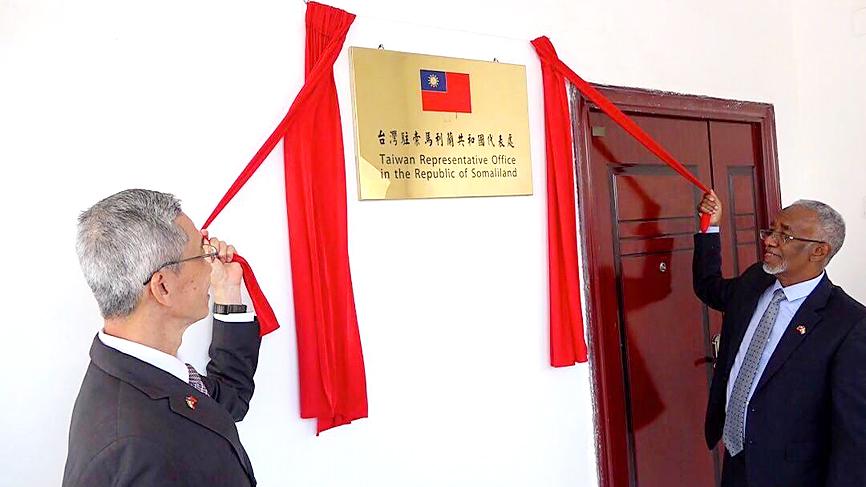Somaliland would officially open a representative office in Taipei early next month, the self-declared east African state’s first representative to Taiwan, Mohamed Omar Hagi Mohamoud, said yesterday.
Preparations are still under way to set up the representative office, but it is expected to start operations on Sept. 9, Mohamoud said.
Working with the representative would be four employees, two who arrived from Somaliland with Mohamoud and two Taiwanese, who have yet to be recruited, he added.

Photo: EPA-EFE
The representative revealed the plan on the sidelines of a seminar held by the Taipei-based Chinese International Economic Cooperation Association on allowing Africa-based Taiwanese businesspeople and African students studying in Taiwan to share their views on exploring trade opportunities on the continent.
It was the first event that Mohamoud has attended since he completed a 14-day quarantine after arriving in Taiwan on Aug. 7.
Mohamoud described relations between Somaliland and Taiwan as “formal,” saying that the proof is February’s agreement signed by their foreign ministers that each would establish a representative office in the other’s country.
High-ranking officials from the two nations participated in a ceremony on Monday last week to mark Taiwan’s opening of its representative office in the Somaliland capital, Hargeisa.
The agreement, designed to pave the way toward greater cooperation, has attracted the ire of China, which considers Taiwan as its territory, and Somalia, which has a similar view of Somaliland.
However, despite Chinese influence and pressure, Mohamoud said that Somaliland’s relationship with Taiwan would remain unaffected.
Somaliland is an independent, sovereign country, Mohamoud said, adding that other countries cannot dictate “with whom we are going to develop relations.”
Somaliland declared independence from Somalia in 1991 after a civil war.
Somaliland has set up 22 representative offices, including in Belgium, Canada, France, Switzerland and the US, Minister of Foreign Affairs Joseph Wu (吳釗燮) said.

Right-wing political scientist Laura Fernandez on Sunday won Costa Rica’s presidential election by a landslide, after promising to crack down on rising violence linked to the cocaine trade. Fernandez’s nearest rival, economist Alvaro Ramos, conceded defeat as results showed the ruling party far exceeding the threshold of 40 percent needed to avoid a runoff. With 94 percent of polling stations counted, the political heir of outgoing Costa Rican President Rodrigo Chaves had captured 48.3 percent of the vote compared with Ramos’ 33.4 percent, the Supreme Electoral Tribunal said. As soon as the first results were announced, members of Fernandez’s Sovereign People’s Party

MORE RESPONSIBILITY: Draftees would be expected to fight alongside professional soldiers, likely requiring the transformation of some training brigades into combat units The armed forces are to start incorporating new conscripts into combined arms brigades this year to enhance combat readiness, the Executive Yuan’s latest policy report said. The new policy would affect Taiwanese men entering the military for their compulsory service, which was extended to one year under reforms by then-president Tsai Ing-wen (蔡英文) in 2022. The conscripts would be trained to operate machine guns, uncrewed aerial vehicles, anti-tank guided missile launchers and Stinger air defense systems, the report said, adding that the basic training would be lengthened to eight weeks. After basic training, conscripts would be sorted into infantry battalions that would take

GROWING AMBITIONS: The scale and tempo of the operations show that the Strait has become the core theater for China to expand its security interests, the report said Chinese military aircraft incursions around Taiwan have surged nearly 15-fold over the past five years, according to a report released yesterday by the Democratic Progressive Party’s (DPP) Department of China Affairs. Sorties in the Taiwan Strait were previously irregular, totaling 380 in 2020, but have since evolved into routine operations, the report showed. “This demonstrates that the Taiwan Strait has become both the starting point and testing ground for Beijing’s expansionist ambitions,” it said. Driven by military expansionism, China is systematically pursuing actions aimed at altering the regional “status quo,” the department said, adding that Taiwan represents the most critical link in China’s

EMERGING FIELDS: The Chinese president said that the two countries would explore cooperation in green technology, the digital economy and artificial intelligence Chinese President Xi Jinping (習近平) yesterday called for an “equal and orderly multipolar world” in the face of “unilateral bullying,” in an apparent jab at the US. Xi was speaking during talks in Beijing with Uruguayan President Yamandu Orsi, the first South American leader to visit China since US special forces captured then-Venezuelan president Nicolas Maduro last month — an operation that Beijing condemned as a violation of sovereignty. Orsi follows a slew of leaders to have visited China seeking to boost ties with the world’s second-largest economy to hedge against US President Donald Trump’s increasingly unpredictable administration. “The international situation is fraught